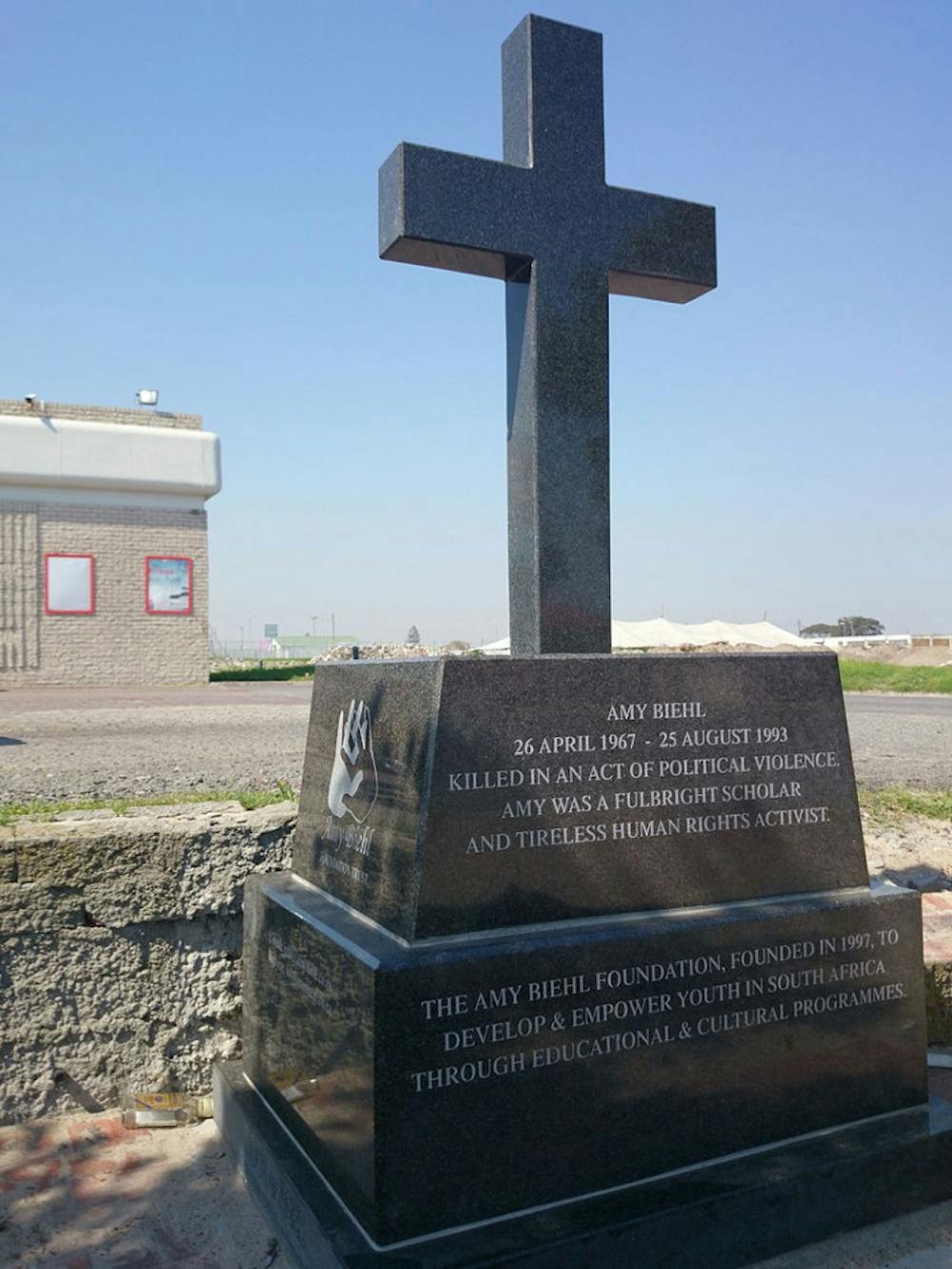Linda Biehl was in her kitchen in Newport Beach, Calif. one afternoon when she received a phone call from one of daughters.
“Are you sitting down?” her daughter, Kim, asked.
Frightened, Biehl asked what had happened. Her daughter responded: “Amy’s dead.”
Amy was another one of Biehl’s daughters - she had been working as a Fulbright scholar in South Africa.
"I didn’t know what to think or feel,” Biehl says.
On Aug. 25, 1993, Amy Biehl, a graduate of Stanford University, was stabbed and stoned to death by a furious group of men as she was walking through the black township of Gugulethu, South Africa. The men thought that Amy, being a white person, was a symbol of apartheid, so they attacked her.
Despite the loss of her daughter, Linda Biehl managed to forgive the four men convicted of Amy’s murder. Now, two of them work for the foundation established in her daughter’s name: The Amy Biehl Trust Foundation. Biehl shared her reflections on her journey to forgiveness with students Tuesday night for the Dundon-Berchtold Institute’s Ethics Week.
South Africa, at the time of Amy’s death, was under apartheid - a system of institutionalized racial segregation and discrimination that lasted from 1948 to 1991. Many lost their lives fighting for liberation.
Amy Biehl, who studied International Relations with an emphasis in sub-Saharan Africa, had Nelson Mandela’s name painted on her graduation cap. Linda Biehl said Amy was passionate about getting involved in anti-apartheid movements, particularly in South Africa.
She received a grant to study in Namibia, Africa prior to Nelson Mandela’s election. After coming back to the United States, she sought more opportunities, and traveled back and forth to Africa over a period of months, eventually ending up with a Fulbright in Gugulethu to teach and to activism work.
Linda Biehl said people would ask her: “How can you let Amy (go to Africa)?”
“‘How can I not?’” Linda Biehl says she responded. “It was an opportunity. Amy pushed everyone to their limits. ‘Get involved’ and 'Be Active,’ she often said.”
And even after her death, Amy’s work left a mark on her family members’ lives. She inspired them to listen to others’ stories and “restore harmony”. They made a decision to continue Amy’s work to reverse the effects of South Africa’s apartheid system.
After Nelson Mandela was elected president in South Africa, effectively ending apartheid, the country’s Parliament established the Truth and Reconciliation Commission (TRC) to heal the nation. Around the same time, Linda and Peter Biehl founded the Amy Biehl Trust Foundation with the help of the U.S. Government to advocate for human rights in South Africa.
Now, the foundation coordinates arts and sports programs, youth education and after-school care, and health and safety trainings throughout South Africa.
Biehl and her family were invited by the City of Cape Town to visit the country. They witnessed squatter homes with neither electricity nor running water, "schools that looked like dumpsters", and many other elements of life there that Biehl says were hard to imagine before seeing it in-person.
“If I had been raised (in this environment), I could have been a militant, myself,” Biehl’s son said, upon seeing life in Cape Town.
This trip solidified the family’s connection with South Africa.
During the trial of the four men convicted of Amy’s murder in the Supreme Court in Capetown, the truth and reconciliation process was underway. That process allowed them an amnesty hearing, wherein the men were absolved of their crimes.
The Biehl family heard the men’s stories in court, and in July 1998, the four men were not only granted amnesty, but also forgiveness from the Biehls.
Linda Biehl described forgiveness and reconciliation as a “learning process”. Two of the men, who regretted what happened and had the courage to approach Biehl about working with the family, now work for the foundation
Although forgiveness was difficult, Biehl says that if the men hadn’t stepped out of their comfort zones, they would not be involved in each other’s lives. Biehl said she’s learned that it’s important to communicate effectively and look people in the eye when aiming to “restore justice and harmony”.
Biehl’s reflection on her daughter’s death and finding a way to reconcile with and forgive the perpetrators inspired the audience. Junior Alec Geenty and sophomore Carrie Fitzgerald were amazed by her ability to forgive the men.
“I feel like it wasn’t possible,” Fitzgerald said. “I can’t imagine forgiving someone the way she did. She’s more like a goddess than anything.”
Geenty wondered how she found “happiness and purpose to go on with life” despite all the tragedies.
“Forgiveness is more for yourself,” Biehl said. “(The men) forgiving themselves was essential in the process.”








